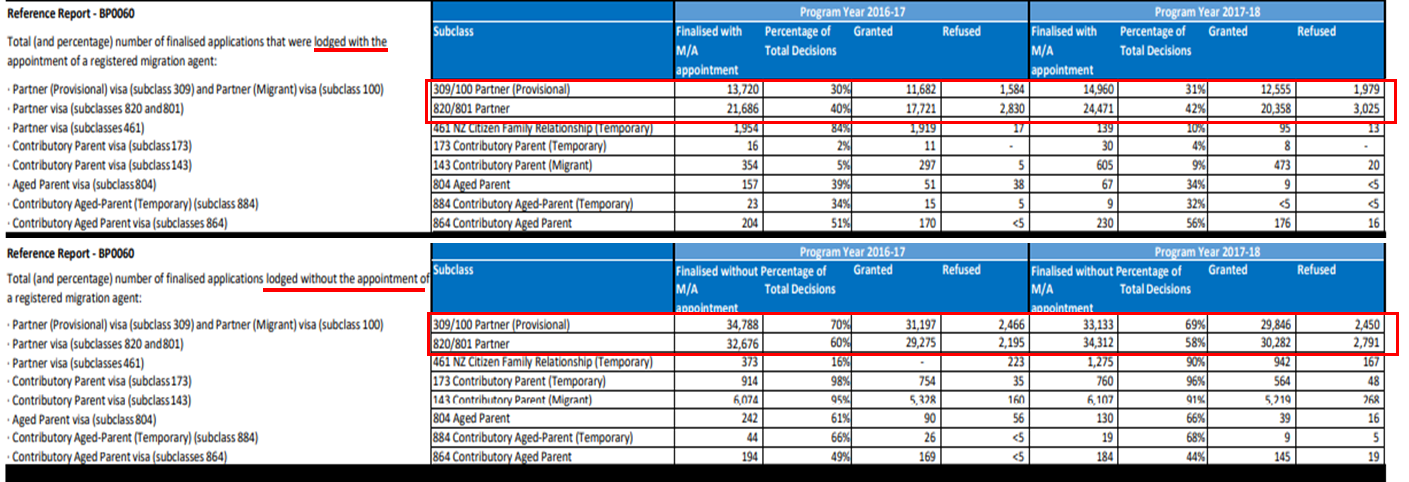Partner visa applications without registered migration agents are more successful
Hi readers!
I’ve got some interesting statistics for you today.
Have you ever had a look at the Department’s Freedom of Information page located here?
What is Freedom of Information you ask? It’s basically where we, the individuals of this country, can hold the government and their agencies accountable for what they do. We are entitled to a certain amount of transparency to see how the government works and how they make decisions on our behalf.
As the Office of the Australian Information Commissioner puts it:
The FOI Act provides a right of access to documents held by Australian Government ministers and most agencies. Most freedom of information (FOI) requests involve people seeking access to documents containing their personal information. Individuals can also request access to documents containing other information, such as information about government policies, programs and decision-making processes.
The FOI Act only applies to information held in the form of a document. The definition of a ‘document’ in the FOI Act includes:
any paper or other material on which there is writing or a mark, figure or symbol
electronically-stored information
maps, plans, drawings and photographs
any article from which sounds, images or writing are capable of being produced.
This applies to our favourite Department of Home Affairs!
You can request any statistics that they’re prepared to give you information on and as you can see the Department has this to say about the FOI:
The Freedom of Information Act 1982 (FOI Act) requires agencies to publish information in a disclosure log within 10 working days after the freedom of information (FOI) applicant was given access to a document.
So what did I find? Does using a registered migration agent increase your chances of successful visa grant for partner visa applications?
Partner visa applications lodged without a registered migration agent are more successful
Have a look at these statistics:
Super blurry picture I know, but the full report can be found here [PDF] or if you go to the Department’s FOI Disclosure log page, look for this report:
I did some maths with the numbers that were provided and here’s what I got:
| Subclass 820/801 | ||||
| Refused visas of total visas | Grant of visas of total visas | |||
| 2016-2017 | 2017-2018 | 2016-2017 | 2017-2018 | |
| With RMA | 13.0% | 12.4% | 82% | 83% |
| Without | 6.7% | 8.1% | 90% | 88% |
What can we conclude from this?
Partner visa applications lodged with registered migration agents have a higher rate of refusal
In the 2016-2017 financial year (which is also the program year for visas) 13% of all total partner visas lodged with the appointment of a registered migration agent were refused. Now compare that to those who lodged their partner visa applications themselves: 6.7% refusal rate.
In 2017-2018 the rates held steady and you would think, phew, migration agents picked up their game but if you look at the raw numbers, there were more visa refusals when lodged by a registered migration agent (3,025) compared to the number of refusals by for individuals who did it themselves (2,791).
The percentage is skewed because there were actually more partner visa applications in 2017-2018.
Number of refusals of partner visa applications lodged with an RMA = 2,830
Number of refusals of partner visa applications lodged without an RMA = 2,195
There is no significant advantage to lodging a partner visa application with registered migration agents
Now looking at the success rates the number of grants for individually lodged partner visa applications compared to the ones lodged with RMAs is almost double.
Across both program years, the success rate of individually lodged partner visa applications sits at 90% and 88% respectively. Once again the 2017-2018 percentage is skewed because there were significantly more partner visa applications but if you look at the raw numbers again there doesn’t seem to be a significant advantage to lodging your application with a RMA.
What next?
RMA are useful if you have a complex situation or you need to strategise in order to plan out your journey. Immigration lawyers can also assist you if you have difficult legal questions regarding your partner visa application and the process.
[Side note on legal advice and accountability: Immigration lawyers can issue you with a legal piece of advice that they’re held accountable to by their licensing authority. Registered migration agents won’t give you anything so concrete, if they can give you that at all.]But my question is, what value are you getting by paying RMAs $3,000-$5,000 to lodge your partner visa application? Remember, this is on top of your $7,160 visa application charge that you have to pay to the Australian government just to apply for the visa.
In total your partner visa could cost you $12,000 if you lodge it with an RMA. So ask what your RMA is doing to earn that fee because you’re still the one that has to provide them with the supporting evidence and documents. You are the one that has to go out and find your witnesses to write those statements for you. You are the one that has to compile all the information about your relationship and then hand it over to them.
So what are you buying for $5,000 when the above statistics are telling you that you have a higher rate of a successful visa grant if you do it yourself? Make them work for their money.





Wow, this was an interesting read and statistics Fiona. Thank you for sharing this information.